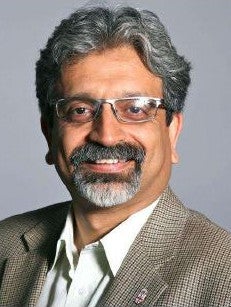The need for higher efficiencies and performance in gas-turbine engines that propel aircraft in the air, and generate ~20% of world’s electricity on land, is pushing the engine operating temperatures to unprecedented levels. Replacing some of the current hot-section metallic components, coated with thermal-barrier coatings (TBCs), with ceramic-matrix composites (CMCs) is making that possible. A different type of high-temperature ceramic coatings system, that includes environmental-barrier coatings (EBCs), is needed to protect CMCs. However, these coatings undergo degradation in the hostile environment of the gas-turbine engine consisting of a combination of high gas temperatures, pressures, and velocities. In addition, there is the ubiquitous presence of steam (a combustion byproduct) and occasional ingestion of calcia-magnesia-aluminosilicates (CMASs) in the form of dust, sand, or ash from the environment. Steam can cause corrosion of EBCs, and the molten CMAS-glass deposits can react with the EBCs resulting in their failure. A perspective on the understanding of these degradation mechanisms, and possible approaches, guided by that understanding, for mitigating the degradation will be presented. Some new concepts in TEBCs that combine the thermal-barrier and environmental-barrier functions in a single coating will be discussed. An outlook on the future challenges and opportunities will be presented.

Nitin P. Padture is the Otis E. Randall University Professor in the School of Engineering, and Director of the Institute for Molecular and Nanoscale Innovation, at Brown University. Previously, he was College of Engineering Distinguished Professor and founding Director of the NSF-funded MRSEC at the Ohio State University, having served on the faculty at the University of Connecticut for 10 years (1995-2005) prior to that. Padture’s research and teaching interests are in the broad areas of synthesis/processing, characterization, and properties/performance of advanced ceramics and nanomaterials used in applications ranging from jet engines to solar cells. He has 220 publications to his credit, which have been cited widely, and he has presented over 230 invited/keynote/plenary talks. A Fellow of the American Ceramic Society, Padture has received that society's Roland B. Snow, Robert L. Coble, and Richard M. Fulrath awards. Padture is also Fellow of the American Association for the Advancement of Science, and some of his other recognitions include the Young Investigator Award from the Office of Naval Research and the Distinguished Alumnus Award from his undergraduate alma mater, IIT-Bombay. Padture is Editor of the journals Acta Materialia and Scripta Materialia.
